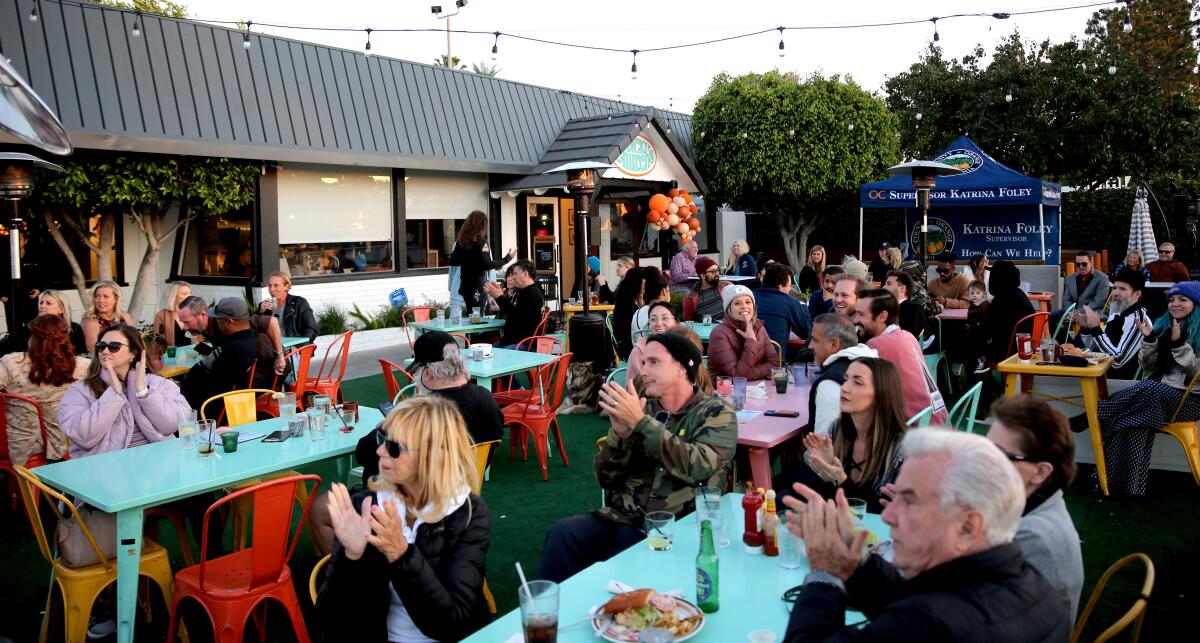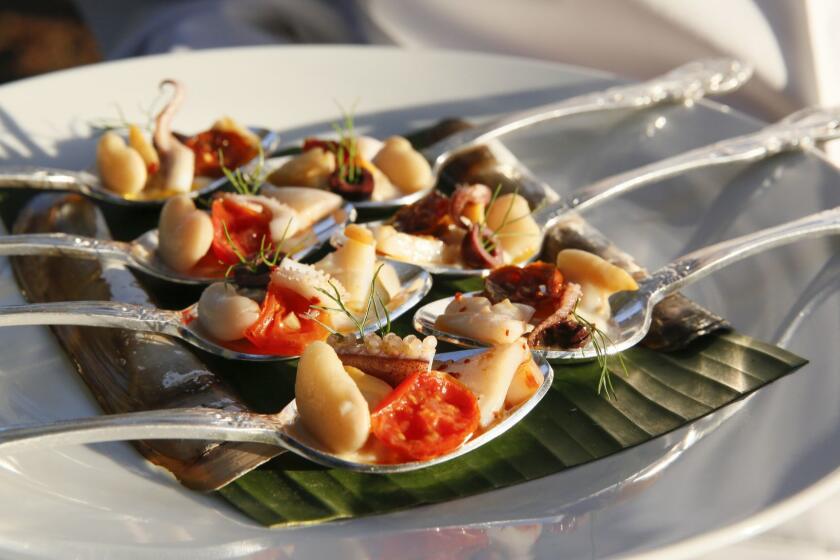Costa Mesa poised to make pandemic-approved outdoor dining permanently legal

The expansion of outdoor dining in Costa Mesa — an emergency accommodation granted to keep local businesses afloat during COVID-19 pandemic shutdowns — has since become an amenity enjoyed by restaurant owners and diners alike.
City officials this week took steps to codify the practice of placing additional seats in setbacks, parking lots and wide walkways and courtyards, approving an ordinance to make such changes allowable on a permanent basis.
The new regulation, which will take effect 30 days after an anticipated second reading in mid-January, allows restaurants to keep, initiate or expand outdoor dining options, so long as it meets a few conditions.
Drive aisles and pedestrian travel must not be blocked, and structures placed in parking lots can only remove up to five spots, or 25% of a business’ required parking, whichever is less. Barriers and walls may only be 5 feet tall, with the top 1.5 feet required to be transparent.
Assistant planner Caitlyn Curley told council members in a regular meeting Tuesday the city has granted a total of 49 temporary use permits to allow for outdoor dining, since an urgency ordinance was first approved in June 2020. With the allowance set to expire at the end of the year, 22 restaurants are still offering outdoor dining.
“Of these active permits the majority ... are located within courtyards and walkways with the second most common location being parking spaces, [occurring] at seven outdoor dining areas,” Curley said.
Costa Mesa planning commissioners in November drafted an ordinance to make such temporary arrangements legal on an ongoing basis. As such, staff approval alone is required for any expansions that constitute less than 50% of the existing business and fall within the parking removal cap. Anything beyond that would require a minor conditional use permit.
The initial ordinance required that any obviously temporary barriers — such as plastic cones, walls and paneling — be replaced with more permanent materials that comply with certain “aesthetic standards.”
City officials approved Tuesday an urgency ordinance making it easier for restaurants — beginning to reopen with distancing restrictions in place — to do business outside.
Jennifer Le, the city’s director of economic and development services, explained the law did not intend to impose requirements that would force those currently holding temporary use permits to cease operations but to create a set of guidelines for future permanent use.
She recalled when the original allowance was made in 2020, a time when indoor dining was prohibited statewide, the shift outdoors was urgent.
“We were all just trying to transition outside for dining. Folks used whatever materials they had — many of them weren’t really built for permanent installations,” Le recalled.
“Our thought process is it wouldn’t be unreasonable to have those materials upgraded from temporary orange barriers to, in some instances, something more permanent, since we are transitioning this permit to a permanent allowance.”
Although council members roundly supported the expansion of outdoor dining, some questioned whether the aesthetic requirement might be too subjective and financially burdensome to impose on local business owners.
Councilwoman Arlis Reynolds made a motion to strike that requirement, and colleague Andrea Marr agreed.
“We did see, in some of the email comments, some of this outdoor area is still providing the necessary commercial activity to kind of keep these businesses in recovery,” she said. “I am a little bit concerned about requiring some additional investment.”
But Mayor John Stephens and Mayor Pro Tem Jeffrey Harlan disagreed, saying that permanently allowing temporary barriers would have a negative visual impact, especially on highly trafficked streets like Newport Boulevard.
“You cannot have cones and funky barriers out on a major corridor of our city permanently, as a matter of right, in Costa Mesa,” Stephens said, making a substitute motion to keep the aesthetic requirement in the ordinance.
Stephens’ motion made provisions for businesses that wanted to experiment with outdoor dining by using temporary barriers for a period of one year before the ordinance would kick in. The motion passed 4-2, with Reynolds and Marr voting against the mayor’s proposal.
Councilman Manuel Chavez said he could have gone either way on the aesthetic requirement, so long as there was some way to keep the pandemic-era practice going on a regular basis.
“For me, what matters aren’t the particular nuances,” he said. “What matters is that it’s legal and that businesses that want to invest in our city, that want to try their luck with less parking and more outdoor dining can do that.”
All the latest on Orange County from Orange County.
Get our free TimesOC newsletter.
You may occasionally receive promotional content from the Daily Pilot.





